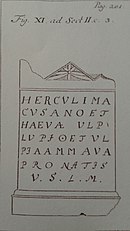Haeva
Haeva is a Germanic goddess whose name is only recorded on a votive stone from the Dutch town of Malburg ( Gelderland ) , which has been lost today , where she is named together with Hercules Magusanus .
"Hercvli Magvsano et Haevae Vlpi (vs) Lvpio et Vlpia Ammava pro natis v (otum) s (olverunt) l (ibentes) m (erito)"
Due to the striking spelling, the name was also read as the Hebe of Greek mythology, the wife of Heracles . In the context of Hercules Magusanus , as the hypostasis of Donar , a Germanic reference in research is more convincingly assumed for Haeva. Since Rudolf Much and Theodor Siebs, the name has been put to Germanic * hiwan "to marry". The function of the goddess is derived from the name and interpreted as the protector of the family. The donors of the votive stone, a married couple, ask pro natis , “for their children”. A concrete connection to later Germanic goddesses such as North Germanic goddesses of the Viking Age must remain speculative, especially to the figure of the Eddic Sif as the wife of Thor. Jan de Vries suspects a functional reference to Frija .
The Haeva was associated with the form of the name Levefanum of the Roman "Kastell Rijswijk", which was handed down from the Tabula Peutingeriana , especially in Dutch research . Levefanum can be derived from Haeva Fanum , "Temple of Haeva" , after Saskia van Dockum, and previously by BH Stolte . Stolte particularly emphasizes this relationship, on the one hand to show the clear Germanic indigenousness of the deities Haeva and Magusanus in relation to the Germanic names of the donors of the votive stones (ie the Magusanus inscriptions), and on the other hand to show the unconvincing attempts at the Germanic god to identify a Greek goddess as a companion. The place name can differ from these representations, if it is interpreted from the Germanic, initially as a doublet of the place name Leufan handed down by Ptolemy . Here only supplemented with another e as a connecting vowel . The established Germanic etymology according to Scheungraber / Grünzweig points to a profane (moist) meadow instead of a sanctuary of a deity on which grass was cut. They put Leve- only possible to Germ. * Lewa- = “cut” and -fanum to Germ. * Fanja- = “Swamp, Moor” ( Fenn ) and compare, among other things, with Old Frisian fenne = “moist meadow”.
See also
literature
- Saskia G. van Dockum : The Dutch river basin . In: Tilmann Bechert , Willem J. H. Willems (Hrsg.): The Roman border between the Moselle and the North Sea coast . Theiss, Stuttgart 1995, ISBN 3-8062-1189-2 , pp. 77-88.
- Siegfried Gutenbrunner : Germanic god names of the ancient inscriptions . Niemeyer, Halle / S. 1936, pp. 106f.
- Karl Helm : Old Germanic history of religion. Universitätsverlag Winter, Heidelberg 1913, p. 378f.
- Corinna Scheungraber, Friedrich E. Grünzweig: The old Germanic toponyms as well as non-Germanic toponyms of Germania. A handbook on its etymology using a bibliography by Robert Nedoma. Published by Hermann Reichert. (= Philologica Germanica 34). Fassbaender, Vienna 2014, ISBN 978-3-902575-62-3 , pp. 206-209.
- Rudolf Simek : Lexicon of Germanic Mythology (= Kröner's pocket edition . Volume 368). 3rd, completely revised edition. Kröner, Stuttgart 2006, ISBN 3-520-36803-X , pp. 165-166.
- BH Stolte: The religious conditions in Lower Germany . In: Wolfgang Haase (Hrsg.): Rise and decline of the Roman world, Vol. II 18, 1 Religion (Paganism: The religious conditions in the provinces) , de Gruyter, Berlin / New York 1986. ISBN 3-11-010050-9 , Pp. 591-671; here 650f.
- Jan de Vries : Old Germanic history of religion . De Gruyter, Berlin - New York 3rd unchanged. Edition 1970. Reprint 2010, Vol. 2, ISBN 978-3-11-002807-2 , p. 320.
